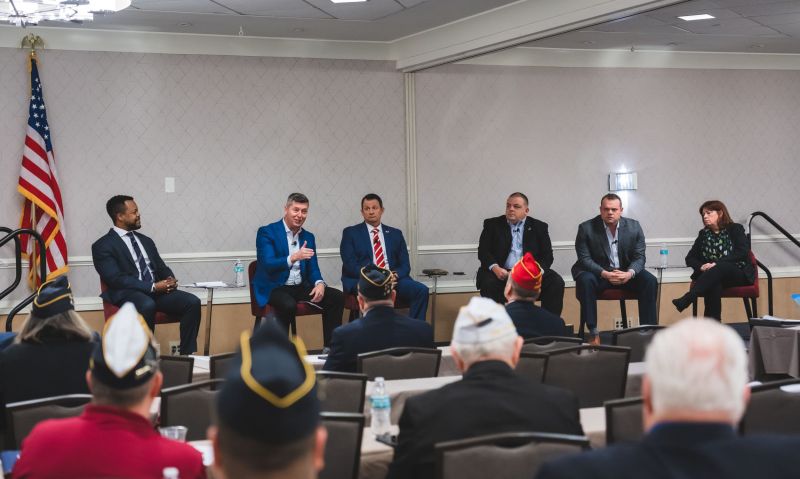
Task Force Movement continues to connect dots for military-trained workers in areas of critical need.
Cybersecurity, as an industry sector, has over 1 million job openings across America. Many are tailor-made for trained U.S. military veterans who may or may not know they are qualified or where to look for career entry points.
Task Force Movement (TFM) explored the challenges – and opportunities – of connecting the dots between military experience, education, certification, industry and government support in a Tuesday breakout session on cybersecurity hosted by The American Legion Veterans Employment & Education Commission as part of the 64th Washington Conference in the nation’s capital. The American Legion has a seat on the steering committee of the task force, established by the White House in April 2022.
TFM initially focused on the nation’s shortage of more than 80,000 commercial truck drivers, an issue that came to a head during the COVID-19 pandemic and supply-chain breakdowns of that time. At The American Legion’s 103rd National Convention in Milwaukee in 2022, cybersecurity was added to the areas of the economy where veterans can be fast-tracked to fill critical gaps. And at the 104th National Convention in Charlotte last year, health care – with a labor shortage estimated at over 2 million – became the third portal.
All three areas received attention from TFM during the Washington Conference Monday and Tuesday. And not just because the economy has jobs to fill. “It’s a major national security concern – huge,” said Jack Dever, TFM’s cybersecurity chairman. “There’s a dearth of cyber talent right now.”
TFM Chairman and former U.S. Rep. Patrick Murphy, first veteran from the war in Iraq elected to Congress, emphasizes the national security aspect of TFM’s mission to get more purpose-driven veterans certified quicker, and more efficiently, in specialized careers.
When a member of the U.S. Armed Forces is discharged, Murphy explained to the Legion’s Veterans Employment & Education Commission in a Monday panel discussion, “They are Marines for life. They are soldiers for life. They are sailors for life. They are Guardians for life. Airmen for life. We have to make sure they understand they are civic assets to this nation … That’s why Task Force Movement is so incredibly important … to make sure that our veterans understand the opportunities that are out there to meet our country’s challenges.”
TFM has worked to bring together often-siloed stakeholders in the transition-assistance landscape.
TFM Treasurer Brandon McPherson told Legionnaires that a key point of the task force when it was created was breaking down those silos. “When we first started Task Force Movement, there were three things we wanted to do, and a couple of things we didn’t want to do,” he said at the Monday panel discussion. “One was, we wanted to be about action. Two, we wanted to ensure that we weren’t being duplicative; if there’s something that already exists somewhere that’s working well, let’s leave that to those organizations. Three is, we said we wanted to be an organization that linked and brought people together and found opportunities for private sector, government, etc., to do what they do best.”
The shortage of cybersecurity professionals in America has risen as an international security concern in recent years as potential adversaries like China are educating and employing a new generation where the lines between military and commercial interests are blurred, Murphy told the Legionnaires.
Meg O’Grady, senior vice president of military affairs for nonprofit National University – with seven colleges across the country and about 50,000 students, about 30% of whom are military-connected – was at the Tuesday session to share how her school is making progress on that front for veterans. “We want to be a capacity builder,” she said, noting that National University has risen to the top five nationwide in cybersecurity among institutions of higher education, working with such industry giants as Amazon and building certification preparation into the curriculum.
Relationships with industry, government, labor, academia and others cultivate connections that lead to scholarship and apprenticeship funds for transitioning veterans entering specialized careers – more than $10 million in scholarships for TFM’s trucking initiative – and increasing assistance for veterans in cybersecurity.
“We know that we’ve got work shortages across a lot of different domains within the United States economy,” TFM Board Co-Chairman Dan Kunze said. “We also know that for quite a while, we outsourced a lot of that … to other nations to support our commercial technology… We offshored a lot. What we’re learning now is that it’s a national security imperative for us to train, develop and cultivate our own workforce. What better place to do that than in transitioning servicemembers?”
Elizabeth Belcaster, executive director of TFM, put the equation simply after her flight to Washington was delayed due to a shortage of air-traffic controllers in Chicago: “It is just a fact of life … There are more jobs than there are workers, and we must engage with those who are already skilled up from the military and bring them into these spaces, especially the areas that are specific to our national security and our economy.”
- Washington Conference

